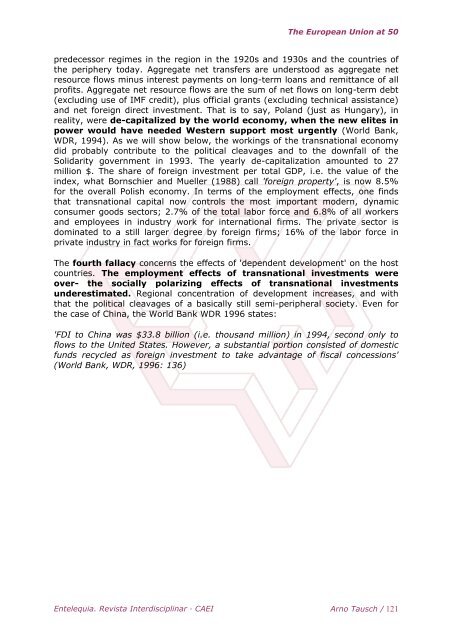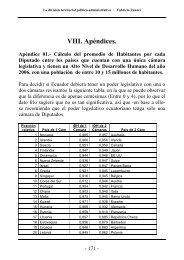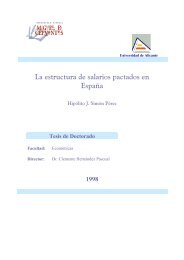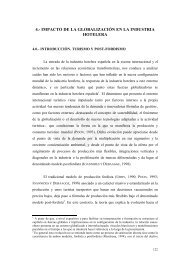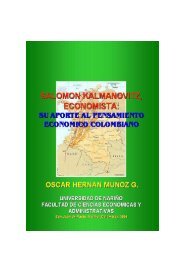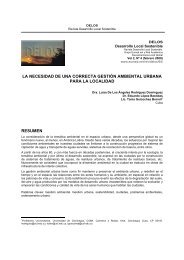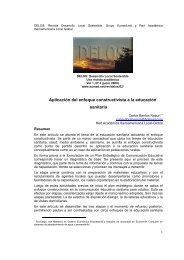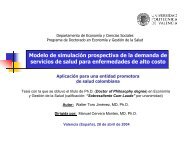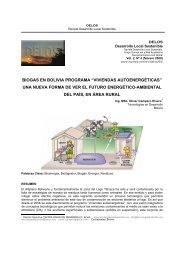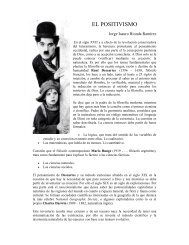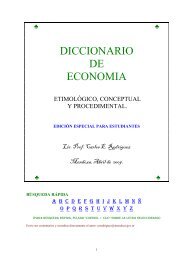Download the full book in PDF format - Eumed.net
Download the full book in PDF format - Eumed.net
Download the full book in PDF format - Eumed.net
You also want an ePaper? Increase the reach of your titles
YUMPU automatically turns print PDFs into web optimized ePapers that Google loves.
The European Union at 50<br />
predecessor regimes <strong>in</strong> <strong>the</strong> region <strong>in</strong> <strong>the</strong> 1920s and 1930s and <strong>the</strong> countries of<br />
<strong>the</strong> periphery today. Aggregate <strong>net</strong> transfers are understood as aggregate <strong>net</strong><br />
resource flows m<strong>in</strong>us <strong>in</strong>terest payments on long-term loans and remittance of all<br />
profits. Aggregate <strong>net</strong> resource flows are <strong>the</strong> sum of <strong>net</strong> flows on long-term debt<br />
(exclud<strong>in</strong>g use of IMF credit), plus official grants (exclud<strong>in</strong>g technical assistance)<br />
and <strong>net</strong> foreign direct <strong>in</strong>vestment. That is to say, Poland (just as Hungary), <strong>in</strong><br />
reality, were de-capitalized by <strong>the</strong> world economy, when <strong>the</strong> new elites <strong>in</strong><br />
power would have needed Western support most urgently (World Bank,<br />
WDR, 1994). As we will show below, <strong>the</strong> work<strong>in</strong>gs of <strong>the</strong> transnational economy<br />
did probably contribute to <strong>the</strong> political cleavages and to <strong>the</strong> downfall of <strong>the</strong><br />
Solidarity government <strong>in</strong> 1993. The yearly de-capitalization amounted to 27<br />
million $. The share of foreign <strong>in</strong>vestment per total GDP, i.e. <strong>the</strong> value of <strong>the</strong><br />
<strong>in</strong>dex, what Bornschier and Mueller (1988) call 'foreign property', is now 8.5%<br />
for <strong>the</strong> overall Polish economy. In terms of <strong>the</strong> employment effects, one f<strong>in</strong>ds<br />
that transnational capital now controls <strong>the</strong> most important modern, dynamic<br />
consumer goods sectors; 2.7% of <strong>the</strong> total labor force and 6.8% of all workers<br />
and employees <strong>in</strong> <strong>in</strong>dustry work for <strong>in</strong>ternational firms. The private sector is<br />
dom<strong>in</strong>ated to a still larger degree by foreign firms; 16% of <strong>the</strong> labor force <strong>in</strong><br />
private <strong>in</strong>dustry <strong>in</strong> fact works for foreign firms.<br />
The fourth fallacy concerns <strong>the</strong> effects of 'dependent development' on <strong>the</strong> host<br />
countries. The employment effects of transnational <strong>in</strong>vestments were<br />
over- <strong>the</strong> socially polariz<strong>in</strong>g effects of transnational <strong>in</strong>vestments<br />
underestimated. Regional concentration of development <strong>in</strong>creases, and with<br />
that <strong>the</strong> political cleavages of a basically still semi-peripheral society. Even for<br />
<strong>the</strong> case of Ch<strong>in</strong>a, <strong>the</strong> World Bank WDR 1996 states:<br />
'FDI to Ch<strong>in</strong>a was $33.8 billion (i.e. thousand million) <strong>in</strong> 1994, second only to<br />
flows to <strong>the</strong> United States. However, a substantial portion consisted of domestic<br />
funds recycled as foreign <strong>in</strong>vestment to take advantage of fiscal concessions'<br />
(World Bank, WDR, 1996: 136)<br />
Entelequia. Revista Interdiscipl<strong>in</strong>ar · CAEI Arno Tausch / 121


